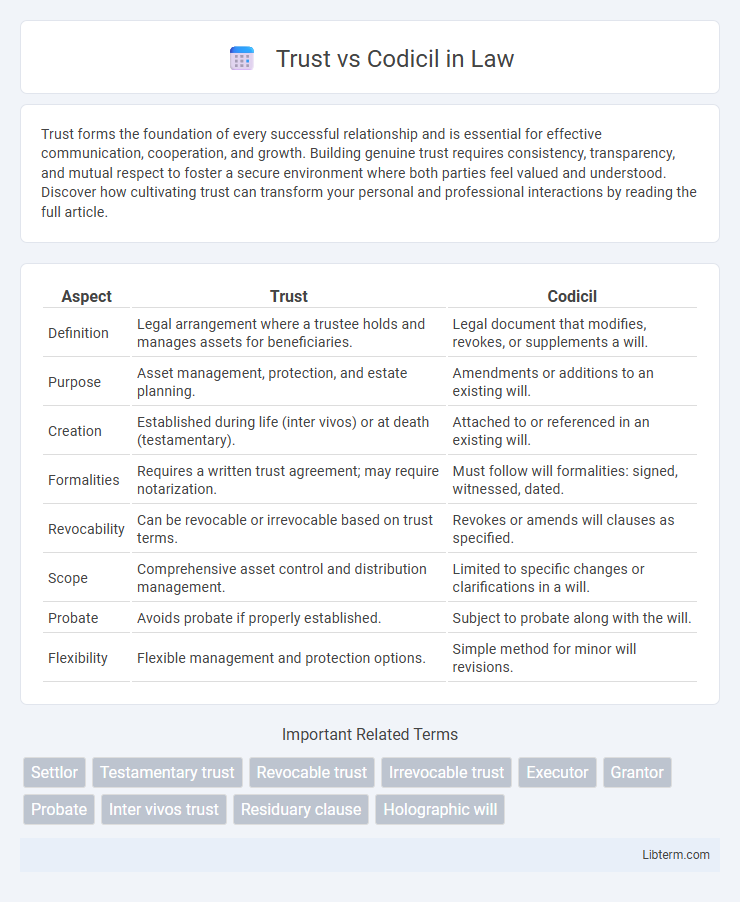Trust forms the foundation of every successful relationship and is essential for effective communication, cooperation, and growth. Building genuine trust requires consistency, transparency, and mutual respect to foster a secure environment where both parties feel valued and understood. Discover how cultivating trust can transform your personal and professional interactions by reading the full article.
Table of Comparison
| Aspect | Trust | Codicil |
|---|---|---|
| Definition | Legal arrangement where a trustee holds and manages assets for beneficiaries. | Legal document that modifies, revokes, or supplements a will. |
| Purpose | Asset management, protection, and estate planning. | Amendments or additions to an existing will. |
| Creation | Established during life (inter vivos) or at death (testamentary). | Attached to or referenced in an existing will. |
| Formalities | Requires a written trust agreement; may require notarization. | Must follow will formalities: signed, witnessed, dated. |
| Revocability | Can be revocable or irrevocable based on trust terms. | Revokes or amends will clauses as specified. |
| Scope | Comprehensive asset control and distribution management. | Limited to specific changes or clarifications in a will. |
| Probate | Avoids probate if properly established. | Subject to probate along with the will. |
| Flexibility | Flexible management and protection options. | Simple method for minor will revisions. |
Understanding Trusts: Definition and Purpose
A trust is a legal arrangement in which a grantor transfers assets to a trustee to manage for the benefit of designated beneficiaries, ensuring asset protection and efficient estate management. It allows for control over asset distribution, tax benefits, and avoidance of probate, making it a powerful estate planning tool. Codicils, in contrast, are amendments to wills and do not offer the same ongoing management or protection features as trusts.
What is a Codicil? Key Features
A codicil is a legal document used to make minor amendments or additions to an existing will without rewriting the entire document. Key features of a codicil include its ability to modify, revoke, or clarify specific provisions of the original will while maintaining the overall testamentary framework. It must be executed with the same formalities as a will, including witness signatures, to ensure its validity.
Differences Between Trusts and Codicils
Trusts establish a legal entity to manage and distribute assets during and after the grantor's lifetime, while codicils are amendments or additions to an existing will. Trusts provide continuous management, often avoiding probate, whereas codicils require validation alongside the original will during probate. Unlike codicils, trusts can offer ongoing asset protection, privacy, and better control over the distribution timeline.
When to Use a Trust in Estate Planning
Use a trust in estate planning to manage and protect assets during your lifetime and ensure smooth distribution after death while avoiding probate. Trusts offer greater privacy and control over how and when beneficiaries receive assets, making them ideal for complex family situations or minor beneficiaries. Establishing a trust is beneficial for reducing estate taxes, protecting assets from creditors, and providing for incapacitation planning.
Situations Best Suited for a Codicil
A codicil is best suited for minor modifications to an existing will, such as updating beneficiaries, changing executors, or adjusting specific bequests without redrafting the entire document. It works well in situations where the testator wants to make quick, simple changes rather than creating a new will from scratch. Codicils are ideal for addressing small estate adjustments or life changes, like marriage, the birth of a child, or amending asset distribution, ensuring legal clarity without extensive legal fees.
Legal Requirements for Trusts vs Codicils
Trusts require a formal written document specifying the grantor, trustee, beneficiaries, and property involved, often notarized and sometimes recorded to be legally valid. Codicils must be in writing, signed, and witnessed according to state laws, serving as amendments to an existing will rather than standalone documents. Trusts generally have more rigorous execution requirements to ensure enforceability, while codicils face stricter witness and signature rules to validate changes to a will.
Advantages of Trusts Over Codicils
Trusts provide greater control over asset distribution by allowing specific terms and conditions for beneficiaries, which codicils cannot offer. They avoid probate, accelerating asset transfer and maintaining privacy, unlike codicils that simply amend wills subject to probate. Trusts offer enhanced flexibility for managing complex estates and protect assets from creditors, whereas codicils serve only as minor will modifications without such protective benefits.
Limitations of Codicils Compared to Trusts
Codicils have limited capacity to make comprehensive estate changes compared to trusts, as they only amend specific provisions in an existing will without altering asset management or avoiding probate. Trusts provide greater flexibility by allowing detailed instructions for asset distribution, management during incapacity, and potential tax benefits that codicils cannot offer. Moreover, codicils may increase the risk of will contests or confusion, whereas trusts typically provide clearer, legally enforceable directives.
Costs and Complexity: Trusts vs Codicils
Trusts generally involve higher setup and maintenance costs due to legal fees, trustee management, and ongoing administrative responsibilities, making them more complex than codicils. Codicils are simpler, less expensive documents used to amend wills without creating a separate entity, but they offer limited flexibility and do not provide the asset protection or probate avoidance benefits of trusts. Choosing between trusts and codicils depends on the complexity of estate planning needs and willingness to manage costs and administrative duties.
Choosing the Right Tool: Trust or Codicil?
Choosing between a trust and a codicil depends on the complexity of your estate and the specific changes needed. Trusts provide comprehensive management and distribution of assets, ideal for avoiding probate and offering privacy. Codicils serve as simple amendments to an existing will, suitable for minor updates without the need for creating a new estate plan.
Trust Infographic

 libterm.com
libterm.com